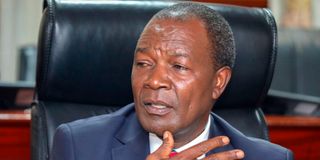Privatisation secrets: What’s the motive behind the idea of avoiding Parliament?

National Treasury Cabinet Secretary Njuguna Ndung’u.
Why create a parastatal to sell other parastatals? That was the big question as President William Ruto last week approved a new Act of Parliament that spells out a new regime and framework for governing privatisation transactions.
It is a major point of departure because the intention of the drafters of the original framework was for a regime where the entity responsible for privatisation would have some relative autonomy.
The name ‘Privatisation Commission’ was deliberate because the drafters wanted the ultimate authority on the politically sensitive issue of sale of government assets to enjoy a modicum of independence – to be insulated from meddling from Cabinet Secretaries and Principal Secretaries – to be guided under a corporate governance regime distinct from the framework under which mainstream state corporations and parastatals are controlled and managed.
Instead of a ‘managing director’, the CEO was an ‘executive director’. And, instead of a ‘board of directors’, the ultimate authority of privatisation would be run by ‘commissioners’ with powers to make executive decisions.
Unlike directors of parastatals, the appointment of commissioners had to be approved by Parliament.
In November 2010, then-Finance Minister Uhuru Kenyatta nominated new commissioners and presented the list to the Finance Committee of Parliament for vetting. It rejected them on the grounds that the nominations did not reflect ethnic diversity.
For nearly two years, the commission could not function because the National Treasury did not nominate a new set of commissioners. The secretariat of the commission – a full bureaucracy – was rendered idle, gobbling taxpayer resources for nothing.
That is the snag the drafters of the law President Ruto approved this week wanted to circumvent. Instead of ‘executive director’, the CEO will be a managing director.
In place of a privatisation commission, it is a ‘privatisation authority’, implying that the institution handling the sensitive duty of selling state assets has to be grouped with entities such as Lake Basin Development Authority, Kerio Valley Development Authority and even some commercial state corporations such as Kenya Ports Authority and the Kenya Airways Authority.
Privatisation transactions have been pushed into a corporate governance system and regime that is mightily messy. The confusion in the running of parastatals occurs because responsibility is shared and spread between too many competing authorities.
As managing director of a parastatal, you report to the board and chairman. You also take instructions from both the Principal Secretary and Cabinet Secretary of your parent ministry. The National Treasury – the shareholder in all parastatals – approves your budgets.
Boards of parastatals are stuffed with too many ex-officio members, representing the line ministry, National Treasury, Attorney-General and Harambee House. And, under the State Corporations Act, Harambee House can unleash an abrupt audit in your operations at any time since the entity known as State Corporations Advisory Committee (SCAC) has immense powers over the whole public sector.
Yet, another unit, the Inspectorate of Statutory Board also has powers to spring surprise audits on managing directors of parastatals. Clearly, what the administration has done amounts to creating another parastatal out of the Privatisation Commission, but in name.
Sovereign wealth funds
While the old act provided eight slots for independent directors, the new Privatisation Act has reduced the number four. An ex-officio member representing the Ministry of Trade and Investment has also been introduced by the new Act. Which begs the question: What’s the motive behind this idea by the Cabinet of keeping approval of privatisation transactions away from parliamentary scrutiny?
Conspiracy theories abound. First, the Ministry of Trade and Industry recently held a record number of investor conferences in capitals of rich Gulf countries and received the feedback that many sovereign wealth funds from that region were interested in privatisation deals here.
That investors from rich Gulf states were scared of the long approval procedures and processes which a potential investor interested in a privatisation deal in Kenya has to go through, including the risk of being dragged before Parliament to be interrogated by those pesky parliamentary committee members.
The government decided to change the law because it was recounting on an upsurge of interest in privatisation deals from wealthy Gulf states.
President William Ruto showed keen interest in the privatisation space right from the beginning of his administration.

President William Ruto during his visit of Swahili Village Restaurant in New Jersey, US.
We all remember how, during the first bell-ringing ceremony at the Nairobi Securities Exchange that he officiated in January, he publicly chastised the CEO of the Privatisation Commission, Joseph Kosgey, for doing no work.
“You should refund the money we have spent on your salaries,” he said, charging that the PIC had not processed any privatisation transaction in the last thirteen years. Whichever way you look at it, the government has made a big gamble by seeking to remove parliamentary oversight in approval of privatisation transactions.
History has taught us that when you move and transfer assets of parastatals without the involvement of constitutionally-mandated oversight bodies, you open the floodgates for corrupt elites who will always angle to grab public assets on the cheap.
The main reason we had too many privatisation scandals at inception of the programme was that we went into selling public assets with neither a privatisation law nor a working and effective oversight regime.
Everything was based on a policy paper that was published in July 1992 but whose contents had no force in law.





